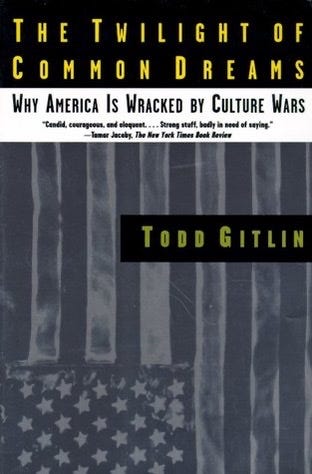A Politics of Commonalities, Not Differences
Todd Gitlin’s prophetic book "The Twilight of Common Dreams" laid out the problems of identity politics—in 1995.
Cultural historian, political activist, and journalism professor Todd Gitlin passed away this weekend at the age of 79, leaving behind a strong legacy of principled examination of American life from an older left perspective centered on personal freedom and economic equality for all. Gitlin was most widely known as a president of Students for a Democratic Society, the preeminent 1960’s youth activist group that issued the famous Port Huron Statement—which outlined New Left thinking about participatory democracy—and drove strong opposition to the Vietnam War.
Gitlin’s later work aimed sharp analysis and forthright criticisms at the internal problems of “the Left” as it moved through the 1970’s and 1980’s away from a universalist perspective of the earlier half of the twentieth century and towards a cacophony of identity-based claims that fractured the movement politically and in electoral terms. Re-reading his 1995 book, The Twilight of Common Dreams: Why America is Wracked by Culture Wars, one is immediately struck by Gitlin’s acute observations about the deficiencies of sectarian politics based on a multiplicity of groups with little adherence to a common story built on American values, history, and civic culture.
Randomly pick any paragraph in the book it will sound like America in 2022, replete with history wars and school fights and debates about multiculturalism and what words people can use.
For Gitlin, the challenges in the early to mid-1990s were the same we face today: Is it possible to come together as Americans around shared values and goals, or must we be consigned to permanent tribal divisions without reconciliation? As Gitlin wrote:
On campus, today’s obsession with difference is distinguished, too, by the haughtiness of the tribes and the scope of their intellectual claims. Many exponents of identity politics are fundamentalists—in the language of the academy, “essentialists”—and the belief in essential group differences easily swerves toward a belief in superiority…
The cultivation of difference is nothing new, but the sheer profusion of identities that claim separate political standing today is unprecedented. And here is perhaps the strangest novelty in the current situation: that the ensemble of group recognitions should take up so much of the energy of what passes for the Left. It is often for good reason that differences have multiplied, making their claims, exposing the fraudulence of the universalist claims of the past. Not everyone is male, white, hearing, heterosexual. Very well. But what is a Left if it is not, plausibly at least, the voice of a whole people? For the Left as for the rest of America, the question is not whether to recognize the multiplicity of American groups, the variety of American communities, the disparity of American experiences. Those exist as long as people think they exist. The question is one of proportion. What is a Left without a commons, even a hypothetical one? If there is no people, but only peoples, there is no Left.
Gitlin in the mid-nineties was not sanguine that the Left could get its act together to overcome its internal differences and appeal to a broad majority of American voters with a political agenda focused on common challenges like poverty, inequality, and corporate power that crossed racial, ethnic, gender, and religious lines. He correctly observed then what we also see now in terms of how easy it is for the right to build a backlash to identity politics, even if it is often disingenuous and infused with its own form of cultural extremism.
He implored his fellow leftists to focus instead on winning based on a genuine commitment to equal dignity and rights for all people:
A Left that was serious about winning political power and reducing the inequality of wealth and income would stop lambasting all white men, and would take it as elementary to reduce frictions among white men, blacks, white women, and Hispanics. Could it be more obvious that the Left and the Democrats alike are helpless unless they offer all these constituencies something they benefit from in common? At the same time, a Left is not a Left unless it defends the scapegoated poor, tries to deliver for them (along with the not-so-poor) training, decent jobs, and provision for children, acknowledging that the present welfare state is not kind to the poor. But multiculturalism by itself does not contribute to that political revival. The most insistent multiculturalists do not seem to recognize that there is no Left, there is only more panic, unless a plausible hope emerges for a greater equality of means. The right to a job, education, medical care, housing, retraining over the course of a lifetime—these are the bare elements of an economic citizenship that ought to be universal.
Sadly, what Gitlin saw as an obvious need in the nineties—a broad coalition of working people focused on overcoming common economic challenges—is not at all self-evident to many on the left today. Politics now is one giant culture war, all the time. Rather than craft an agenda to appeal to people across racial and class lines, political forces today spend most of their time deepening these divisions in a fruitless search for cultural supremacy and power that is often fleeting. Meanwhile, Americans on the whole suffer from a lack of common vision and a commitment to one another as true equals—all worthy of respect, rights, and economic opportunities.
As we look back at Gitlin’s time and ideas, we should heed his parting call in the book: “Enough bunkers! Enough of the perfection of differences! We ought to be building bridges.” Hear, hear.



